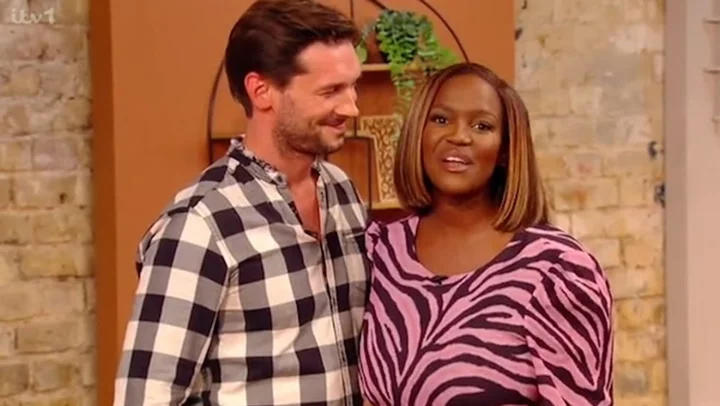
Oti Mabuse says she had stopped trying to conceive before becoming pregnant: ‘Nothing was happening’
Oti Mabuse has revealed that she and her husband Marius Iepure had stopped trying to conceive when she discovered she is pregnant with their first child. The former Strictly Come Dancing star announced on Saturday (26 August) that she is expecting, describing the pregnancy as “the best news we could have ever asked for”. Mabuse, 33, shared in an Instagram Story on Monday (28 August) that she had initially “given up” on trying to conceive because “nothing was happening”. She posted a video of her and her friend Nkateko Dinwiddy celebrating her pregnancy, and wrote over the clip: “My friend @takkies7 asked me to [take a pregnancy test] because I was drinking coffee and I don’t drink coffee. “We had been trying for a while and decided to stop (it all just got too much) and just live life as us two as nothing was happening. “We enjoyed each other’s company, dinners, concerts, parties, just simply removed all the pressure and here we are!” In another Instagram Story, she shared a screenshot of a WhatsApp conversation between her and Dinwiddy, showing her friend asking if she had taken a pregnancy test yet. Mabuse replied: “Ahhhh why? [cry-laugh emoji] Don’t stress me I’ve actually given up.” But the Dancing On Ice judge shared the happy news over the weekend live on her ITV Breakfast Show. She also shared a series of photographs of her and Iepure cradling her growing baby bump on Instagram and wrote in the caption: “We love our little bundle of joy so much already… and can’t wait to see what our future will look like now as a family of three plus Leo. “It’s been a beautiful journey so far with close friends and family and nearly over but we have learnt a lot along the way… Christmas is about to get even louder.” Mabuse also shared a video montage of the moment the couple shared the news with their close friends and family over FaceTime and in person, including with her sister, Strictly judge Motsi Mabuse. The expectant mum said in her caption: “Living in a different country as a couple means you don’t have family around to break the news face to face to. “And most often, friends become family. We are so extremely lucky with our group of friends. Disclaimer: This isn’t all of them, not enough video space. But we kept our circle really tight, full of positive energy, laughter and joy.” Motsi left a comment under the video and said: “Just cried again [red heart emoji].” Mabuse and Iepure met in Germany as dance partners in 2012. He proposed to her in 2014 on her birthday and they married that same year. Read More ‘My depression ate me up and stopped me doing the thing in life I loved the most – cooking’ BBC Breakfast’s Emma Vardy announces birth of son: ‘Presenting my best breaking news ever’ Maya Jama and Stormzy ‘confirm relationship’ as they’re seen holding hands in Greece Oti Mabuse announces she is pregnant with her first child Amy Dowden reveals ‘life-threatening’ sepsis diagnosis amid cancer treatment BBC Breakfast’s Emma Vardy announces birth of first child
1970-01-01 08:00

Amy Dowden reveals ‘life-threatening’ sepsis diagnosis amid cancer treatment
Amy Dowden has revealed that she was recently diagnosed with “life-threatening” sepsis as she underwent cancer treatment earlier this month. The Strictly Come Dancing star, 33, told her nearly 490k followers on Instagram that she suffered a “setback” in her treatment and had to spend “several days in hospital” being treated by an ICU team. In June, Dowden underwent a mastectomy after being diagnosed with stage three breast cancer the month prior. She began chemotherapy earlier this month after doctors found another type of cancer. Speaking to Hello! magazine in a new interview, the professional dancer said she started feeling ill two days after her first round of chemotherapy and started getting a fever. “I started having a temperature of 37.7 degrees Celsius,” she recalled. “At the time, I didn’t realise that having a temperature of 37.5 or above could be fatal for a chemo patient. I just thought it was my reaction to chemo, but as it turned out, I had already got an infection.” She added: “I felt freezing cold but I was all clammy and shaking. My mum and dad rang my red card [which provides the chemotherapy team’s contact details and current treatment information] and they said to hang up and ring the ambulance.” Dowden continued: “I didn’t want to go into hospital; at the time I didn’t realise how ill I was. “I knew it was a Saturday night, so A&E would probably be crowded, and it was dangerous being around people as it’s more likely you’ll pick up an infection. “On chemo, you don’t have your white blood cells to fight infection. We now know I had the infection just before I started chemo, but we were never able to pinpoint what actually caused it.” Dowden said she was so ill that she couldn’t really understand the danger she was in. “The doctors and nurses were telling me I had sepsis and that it was life-threatening, but I wasn’t taking it in,” she said. “I didn’t become properly aware until later. I told my dad, ‘I’ve got sepsis’ and he said, ‘I know!’” On her birthday on 10 August, Dowden spent the day in hospital after her temperature went up again. She is currently recovering at home and has been able to continue her chemotherapy treatment. The treatment has caused the TV star to start losing her hair and she now wears a wig, but she is hopeful she will be able to appear on the forthcoming series of Strictly in some way. She revealed that the Strictly production team is “getting me some fabulous wigs ready”. “The team are being guided by me – they’ve been utterly amazing,” Dowden said. “We’ve got some dates in the diary, but it will depend on how I feel. We’re taking it a step at a time.” Dowden’s professional dancer colleagues on the show have been sending her videos, flowers and presents to encourage her as she undergoes treatment, she added. “I speak to Dianne [Buswell] every single day. This is impacting on them as well because we’re a team,” she said. “I’m grateful they are including me because Strictly will help me get through the next few months, mentally. It’s just the tonic that I need.” Last week, Dowden opened up about her hair loss and admitted she was finding it “so hard”. She shared a photo of a clump of her hair that had fallen out with a series of broken heart emojis and wrote: “So much everyday! So hard! One day at a time!” After her mastectomy, Dowden was told she needed chemotherapy as doctors found further tumours after the surgery. In an Instagram Live chat, she said: “They found another type of cancer and then they told me I needed chemo – for me that was a massive blow. It wasn’t in the plan, originally – and I know the plan you can’t get fixated on.” Dowden is married to her long-term partner Benjamin Jones, who is also a professional dancer. The couple wed in 2022, after having to reschedule their wedding due to the Covid pandemic. Read More ‘My depression ate me up and stopped me doing the thing in life I loved the most – cooking’ Maya Jama and Stormzy ‘confirm relationship’ as they’re seen holding hands in Greece Pilot makes sweet announcement to his flight attendant mother on first flight together Strictly’s Amy Dowden finding it ‘so hard’ as she shares hair loss update amid cancer BBC Breakfast’s Emma Vardy announces birth of first child Ultra-processed food may cause ‘tidal wave of harm’, including heart attack, stroke
1970-01-01 08:00

BBC Breakfast’s Emma Vardy announces birth of son: ‘Presenting my best breaking news ever’
BBC Breakfast star Emma Vardy has welcomed her first child with husband Aaron Adams. The co-host of the morning news programme announced her “best breaking news ever” on Instagram, where she shared a photo of herself cradling her newborn. Vardy first revealed her pregnancy in May, when she shared a photo of her baby bump after a day of surfing in Co Sligo. The BBC Ireland correspondent wrote on Instagram: “Presenting my best breaking news ever. Baby boy Jago Fionn is here. “At just a few hours old, playing a little camera shy. Huge thanks to the dedicated and talented midwives and doctors at Belfast’s Royal Victoria Hospital for looking after us so well.” She added that she and Adams were “smitten and so in love”. The photo was a selfie taken from her hospital bed as she cuddled the newborn baby, who has dark hair and was dressed in a white onesie. Announcing the news of her pregnancy in May, Vardy posted a photo of herself holding a surfboard as she showcased her bump. She wrote: “Well folks it’s definitely getting a bit harder to balance…. extra cargo hitching a ride!! Still managing to catch a few waves though. “Beautiful weekend in Co Sligo, and a very exciting summer ahead!!” She added: “#paddlingfortwo #babyonboard.” Last month, Vardy celebrated her baby shower and shared a series of photos from the joyous event. She wore a one-shouldered white gown and a beautiful pink and yellow flower crown as she posed in front of a large blue-and-white balloon display. Other photos included in the post showed her friends and family posing with her, all wearing green flower crowns, as well as photos of the decoration and tablescape for the event. “Belated Babyshower spam for the gram,” she wrote in the caption. Vardy married Adams in March 2022 in Co Antrim, where Adams’ son Jonah acted as ring bearer. Read More ‘My depression ate me up and stopped me doing the thing in life I loved the most – cooking’ Maya Jama and Stormzy ‘confirm relationship’ as they’re seen holding hands in Greece King Charles planning ‘major shakeup’ to Royal Household staff Elle King opens up about her ‘deep depression’ amid two-year postpartum journey Sienna Miller pregnant with her second child Serena Williams celebrates second pregnancy with ‘pre-push party’
1970-01-01 08:00

Ultra-processed food may cause ‘tidal wave of harm’ including stroke and heart attack risk
Two new studies have found conclusive links between the consumption of ultra-processed foods (UPF) with increased cardiac disease risk, including heart attacks and strokes. The research, presented at the annual meeting of the European Society of Cardiology in Amsterdam, found highly processed food sold in stores across the world, such as fizzy drinks, cereals and ready-to-eat meals, may lead to an increased risk of cardiovascular diseases and hypertension. Henry Dimbleby, the UK government’s former food tsar, said the findings should be a “wake-up call” for the country. “Britain is particularly bad for ultra-processed food. It is storing up problems for the future,” he told The Guardian. “If we do nothing, a tidal wave of harm is going to hit the NHS.” One of the studies, conducted by scientists from the Fourth Military Medical University in China, conducted a review of 10 studies that included 325,403 participants and 38,720 cases of cardiovascular disease (CVD) events, including heart attack and stroke. It found a conclusive association between UPF and heart disease risk. Scientists found that a 10 per cent increase in UPF consumption in daily calorie intake is linked to a 6 per cent rise in heart disease risk. Researchers also observed that the lowest risk was at a less than 15 per cent per day of UPF consumption out of total calorie intake. However, heavy UPF consumption “was significantly and positively associated with increased risk of cardiovascular events,” scientists noted. The other research, also presented at the world’s largest heart health conference, assessed the link between UPF intake with CVD and hypertension in a population of middle-aged women in Australia. Scientists, including those from the University of Sydney, assessed health data of about 10,000 women aged 46-55 years who were recruited into the Australian Longitudinal Study on Women’s Health and followed for 15 years. They assessed the contribution of UPF in the daily dietary intake of these women as well as their self-reported heart disease and stroke, and/or hypertension incidences. The women included in the study had an average UPF intake of 26.6 per cent of total food dietary intake. Over their 15 years of follow-up, scientists found 1,038 incident CVD and 4,204 hypertension cases. Among the middle-aged women, scientists observed that a higher UPF intake was associated with higher risk of CVD and hypertension. “These findings lend support to minimising UPF intake as a component of a heart-healthy diet,” scientists wrote in the study. Taken together, the findings hinted that the harm caused by UPF may be more than just due to their high salt and fat content. “If there is something inherent in the processing of foods that is harmful, then that is a disaster,” said Mr Dimbleby. Read More First-of-its-kind study finds laughter is indeed good medicine, especially for the heart How many steps a day can cut risk of early death (and it’s not 10,000) Weight loss jabs improve heart failure symptoms in obese patients – study First-of-its-kind study finds laughter is indeed good medicine How many steps a day can cut risk of early death (and it’s not 10,000) ‘Boy moms’ called out for dubious logic behind teaching their sons to cook
1970-01-01 08:00
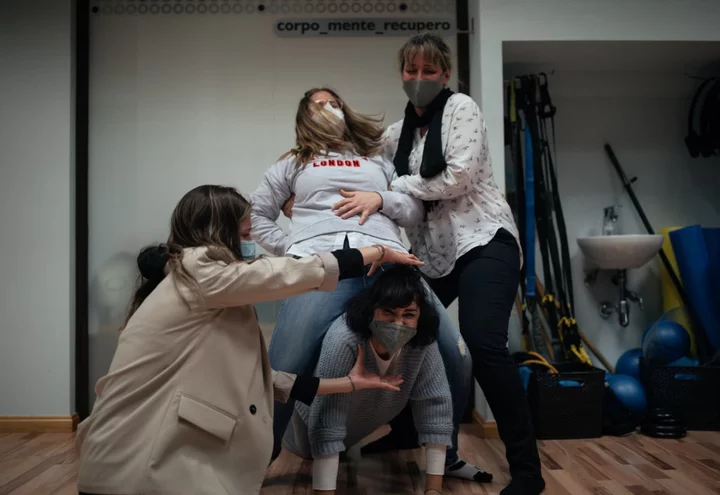
First-of-its-kind study finds laughter is indeed good medicine, especially for the heart
A new, first-of-its kind study has demonstrated that laughter can indeed be good medicine – especially for those with heart disease. Laughter therapy can increase the functional capacity of the cardiovascular system that includes the heart, lungs, arteries and veins, found the yet-to-be peer-reviewed research presented at the annual meeting of the European Society of Cardiology in Amsterdam. Researchers, including Marco Saffi from the Hospital de Clínicas de Porto Alegre in Brazil, found reduced inflammation and better signs of health among coronary artery disease patients who engaged in a course of laughter therapy. They found laughter therapy sessions could cause the tissue inside a patient’s heart to expand, potentially leading to increased oxygen flow through the body. Until now, different treatments without the use of drugs have been studied in coronary artery disease patients, but the benefits of rehabilitation using laughter therapy was not fully assessed, scientists said. In the new study, the impact of laughter therapy on the functional capacity, tissue function as well as markers of inflammation in the bodies of patients with coronary artery disease was evaluated. The condition, which is one of the most common diseases in the world, arises when the heart’s coronary arteries struggle to supply the organ with enough blood, oxygen and nutrients. Scientists conducted a clinical trial involving 26 adults with an average age of 64 from August 2016 to December 2020, measuring each of their oxygen uptake and the widening of their main artery when blood flow increases. Researchers also measured levels of molecules in the patients’ bodies, indicative of inflammation such as interleukin (IL)-6, IL-10, tumour necrosis factor (TNF)-alpha, vascular cell adhesion molecule (VCAM) and intercellular adhesion molecule (ICAM). Thirteen of the patients were assigned to the group that underwent laughter therapy by watching two self-selected TV comedy shows per week. The other 13 served as the control group and watched “neutral documentaries”, scientists noted. They said the study is the first controlled clinical trial to evaluate the impact of rehabilitation using laughter therapy on patients with coronary artery disease. It revealed an increase in the body’s peak oxygen uptake and improvements in tissue function as well as the body’s markers of inflammation. The new findings are in line with previous research that suggested having a good laughter session makes the body release endorphins, which are hormones that reduce stress and inflammation and help the heart and blood vessels relax. Based on the new results, presented at the world’s largest heart conference, scientists say laughter therapy may constitute an “effective form of cardiac rehabilitation in this patient population”. Read More How many steps a day can cut risk of early death (and it’s not 10,000) A broad genetic test saved one newborn's life. Research suggests it could help millions of others Snoring before age 50 is a health ‘red flag’, experts suggest How many steps a day can cut risk of early death (and it’s not 10,000) Experts warn that snoring before you turn 50 is a health ‘red flag’ ‘Boy moms’ called out for dubious logic behind teaching their sons to cook
1970-01-01 08:00
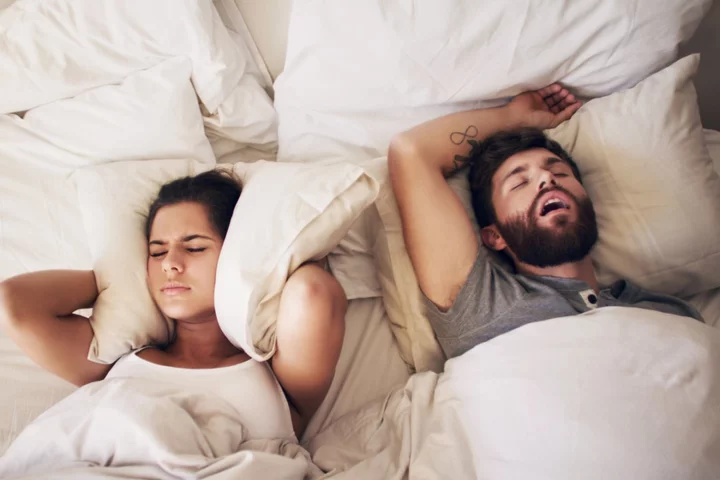
Snoring before age 50 is a health ‘red flag’, experts suggest
Young adults who snore at night have a significantly higher risk of having a stroke and developing heart disease when they get older, a study has warned. Doctors have said that snoring should be treated as a “red flag” among adults below the age of 50. The study found that young adults who snore are 60 per cent more likely to develop a stroke when they reach middle age, and five times more likely to develop a heart rhythm disorder. The researchers presented their findings at the European Society of Cardiology Congress in Amsterdam. They examined data from 766,000 US adults aged 20 to 50. These included 7,500 adults with obstructive sleep apnoea, a condition that causes interruptions to normal breathing during sleep. This can lead to loud snoring and interrupted sleep as sufferers wake up while struggling to breathe. The study found that, over the 10-year follow-up period, patients with sleep apnoea were 60 per cent more likely to suffer a stroke compared to those who did not snore as frequently. They were also five times more likely to develop atrial fibrillation, a heart condition that causes irregular and often abnormally fast heart rate. Symptoms of atrial fibrillation include heart palpitations, dizziness and shortness of breath. Lead author Professor Sanjiv Narayan, of Stanford University, said: “Sleep apnoea is really common but we sort of ignore it because we think it’s trivial or just a little bit of a nuisance. “Until now no one’s really shown the magnitude of the size of the risk for heart diseases. That’s what really surprised us.” He added that the study looked at “relatively young people” who may not know they are at risk. “If they had a stroke, it would devastate young families. It could take them away from their workplace. It would destroy their lives for the next 40 years.” The researchers suggest that GPs should ask patients regularly if they snore and highlight if as a heart health “red flag” that could show they need more tests or medication. Obstructive sleep apnoea is fairly common and is estimated to affect 1.5m adults in the UK. However, according to the British Lung Foundation, up to 85 per cent of sufferers are undiagnosed and go untreated. Men who are elderly and overweight are particularly prone to sleep apnoea. Interruptions to normal breathing can cause a dip in blood oxygen and cause the heart and blood vessels to strain. Prof Narayan explained: “When you are unable to breathe it raises the pressure in the lungs until you ultimately wake up gasping for breath. That puts a pressure load on the heart, which causes stretch in the heart chambers, and that could cause the atrial fibrillation. “Another theory could be that the oxygen levels in the blood fall for tens of seconds and that could put stress on the heart.” Sleep apnoea can be treated using a CPAP machine, a device that pumps air into a mask that the patient wears over their mouth or nose while they sleep. The NHS also recommends making lifestyle changes such as losing weight if the patient is overweight and exercising regularly, which can improve symptoms. Sleeping on your side may also help relieve sleep apnoea. Read More I feel it in my fingers: Why more of us should start eating with our hands Sean O’Malley sparks outrage after claiming it’s OK if he cheats on his wife Woman praised for refusing to switch seats with child during eight hour flight Liam Payne reveals he was hospitalised due to a ‘serious kidney infection’ ‘Boy moms’ receive backlash for teaching sons how to cook - but for the wrong reason This is how stress affects different parts of the body
1970-01-01 08:00

Liam Payne reveals he was hospitalised due to a ‘serious kidney infection’
Liam Payne is on the road to recovery, as he revealed that he was recently hospitalised due to a kidney infection. The singer, 29, took to Instagram on 25 August to share the news, while he announced that his upcoming tour - which was supposed to start next month - is going to be postponed. He expressed that his doctors advised him to focus on his health, after he’d been hospitalised due to a kidney infection. “It’s with a heavy heart I have to tell you that we have no other choice but to postpone my upcoming tour of South America,” he wrote in the caption, alongside a video of himself. “Over the past week I’ve been in hospital with a serious kidney infection. It’s something I wouldn’t wish on anyone, and doctors orders are that I now need to rest and recover.” While Payne expressed that he was “beyond excited to play” music, he acknowledged that fans will soon be refunded for their tickets. However, the former One Direction member also added that the new dates haven’t been decided yet. “To all of you who have bought tickets, I’m so sorry. We’re working to reschedule the tour as soon as we possibly can, but for now we will be refunding the tickets. So, please look out for updates from your point of purchase,” he wrote. “Thanks as always for the love and support, and look forward to seeing you soon.” In his video, the “Bedroom Floor” singer went on to describe how he’d been a “bit unwell” recently, following the “bad kidney infection”. “We started rehearsals, and I’ve just been advised that now is not the right time for me to be out on the road, trying to recover from this,” Payne said. “I have the best people around me at home trying to help me recover as we speak.” He also added that he hopes that when the time comes, he could “put on an even bigger show” for his fans. According to the National Health Service, hospitalisation as a result of kidney infection can occur for a variety of reasons - such as when a patient is severely dehydrated, unable to swallow or keep down any fluids or medicines, or has a weakened immune system. Fans rushed to the comments section of Payne’s video, where they sent him sweet messages and hoped for him to make a healthy recovery. “Always got your back, champ,” one wrote, while another added: “Get well soon! Love you and here for you forever and always.” A third wrote: “Sending one massive BIG hug your way.” The tour was initially set to kick off on 1 September in Lima, Peru, with his final show in Mexico City, Mexico, on 12 September. In July, Payne made his official return to his YouTube channel, where he discussed how excited he was to go back on tour. He also spoke candidly about his health, after finishing a 100-day rehabilitation stay and was nearly six months sober. Payne went on to admit that prior to sharing the YouTube video, he removed himself from the public eye for his mental well-being. “I just needed to take a little bit of time out for myself actually, because I kind of became somebody who I didn’t really recognise anymore,” he explained. “And I’m sure you guys didn’t either. I was in bad shape up until that point and I was really happy to kind of put a stopper to life and work.” In the YouTube video, the “Strip That Down” singer also discussed his appearance on Logan Paul’s podcast, Impaulsive. Payne expressed regret for some of the things he said about Zayn Malik, after professing that there were “many reasons why he disliked” his former One Direction bandmate. “I think for me, a lot of what I said just came from the wrong place,” Payne recalled. “I was so angry at what was going on around me that instead of taking a look inwards I decided to take it outwards.” Payne said he thought his anger stemmed from frustrations with his career and, rather than reflecting privately, he took his feelings out on others. He added that he “wanted to apologise” for his behaviour. Read More Liam Payne apologises for Zayn Malik comments as he completes 100 days in rehab Zayn Malik discloses ‘underlying issues’ that led to him quitting One Direction: ‘We got sick of each other’ Liam Payne says he’s over 100 days sober: ‘I feel amazing’ ‘Boy moms’ receive backlash for teaching sons how to cook - but for the wrong reason This is how stress affects different parts of the body Chris Pratt’s daughters give him a glittery makeover
1970-01-01 08:00

‘Boy moms’ receive backlash for teaching sons how to cook - but for the wrong reason
Many people are calling out mothers of sons - also known as “boy moms” - for the reason why they’re teaching their sons how to cook, as some people call it a “red flag”. The TikTok trend first began when user Laura Elizabeth Graham shared a video of herself cooking in the kitchen with her young son, as she wrote over the clip: “Making sure my son can cook so he’s not impressed by your daughter’s [Stouffer’s] lasagna.” She continued to write in the video’s caption that her son would need a “home-cooked meal” from his future wife. Meanwhile, fellow “boy moms” also hopped on the trend, as one shared a similar video how she was teaching her son cooking skills so “he’s not impressed by your frozen pizza daughter”. The videos have since sparked a debate, as many users replied that they were teaching their sons to cook “because it’s a necessary life skill for independence.” “Teaching my son to cook because it’s a basic necessity,” one person commented under Graham’s video. Another person proclaimed they were “team daughter-in-law,” while one viewer added that the trend was “screaming red flags”. In response to the TikTok trend, some mothers took the opportunity to point out that showing young boys how to cook - just so that he’s not “impressed” by someone else’s cuisine - only teaches him to expect a higher level of household labour from his future partner. In fact, TikTok user Payal Desai posted a series of videos showing the ways in which she was teaching her sons how to take care of themselves - emotionally and physically - as they grow older. In one video, Desai showed her sons how to clean the dishes and explained why she does it: “So your daughter doesn’t have to deal with a man who was catered to his whole life.” @lauraelizabethgraham He’s gonna need a home cooked meal Felicia ? #boymom #boymomlife #boymomsoftiktok #mamasboy #mommasboy #mamasboys #relatablemom #motherinlaw #motherinlawproblems #momsoftiktok IB: @brontevictoria.capowski ♬ original sound - Laura Elizabeth Graham Many mothers of young boys also joined in, showing the ways in which they were empowering their sons to be more self-sufficient and responsible. Meanwhile, psychologist and mother Amber Wardell reacted to the TikTok trend, saying in a video: “I’m teaching my son to cook so that he will show up for his future wife as though she’s his partner and not his servant.” The ongoing trend to categorise parents as a “boy mom” or “girl dad” reportedly perpetuates gender stereotypes. “The gendering process then continues through quite literally every aspect of that child’s life: the pink or blue newborn hospital beanie, the princess or football player clothing gifted at the baby shower, the jungle or fairyland nursery room decor, and of course, the toy trucks or baby dolls,” Dr Jessica N Pabón-Colón - an associate professor of women’s, gender, and sexuality studies at SUNY New Paltz - explained to Refinery29 in 2021. @payalforstyle No dust here. #dustyson #dustydaughter #trend #boymom ♬ original sound - Bryan Pabón-Colón emphasised that juxtaposing opposite genders, in hashtags like #BoyMom, also reinforces supposed gender differences. Speaking to the outlet, she explained that both the #GirlDad and #BoyMom trend “announces the ‘feminine’ mother’s ability to parent a child whose ‘masculine’ gender is different from hers,” and ultimately suggests that parents of the opposite gender have to try harder to relate to their girls and boys. @sensible_amber This is how we create snobby, entitled men who treat their wives like the help and constantly compare them to mommy dearest. Let’s teach our boys to be self-sufficient, nurturing, compassionate, and supportive. Let’s teach them that their wives do not exist to be their mommies. Most importantly, let’s teach our sons that it is HEALTHY and NORMAL for them to one day leave us and become more attached to their wives than they are to us, and that this is what we WANT for them. Otherwise, we’ll all end up with our boys living with us forever — not because they love us but because no women will have them. They’ll be divorced, lonely and miserable, and we’ll still be cooking their meals. Is this really what we want for our sons? #motherhood #momlife #motherhoodunplugged #motherhoodunited #parenting #boymom #biymomculture #toxicboymomculture ♬ original sound - Amber Although seemingly innocuous, she suggested that this mentality does more harm than good. While the hashtags themselves aren’t harmful, Pabón-Colón emphasised that their stereotypes are limiting. She argued that “the label ‘boy’ cannot possibly contain [a child’s] personality traits,” and that there’s more to any one person than their sex or gender. “Having a vulva does not explain a child’s desire to have a tea party with their dad any more than having a penis explains a child’s desire to climb a tree with their mom,” Pabón-Colón said. The Independent has contacted Laura Elizabeth Graham for comment. Read More Homeowner sparks criticism after telling contractor not to use her bathroom Bride tries on mother’s wedding dress 30 years after parents’ wedding Mom documents at-home abortion to destigmatise abortion pills Schoolboy almost dies from swallowing magnets for TikTok challenge Woman shares honest review of New York City apartment TikTok mom slammed after making 5-year-old son run in 104 degree heat
1970-01-01 08:00

Chris Pratt’s daughters give him a glittery makeover
Chris Pratt has shown off his sparkly new look after his daughters gave him a makeover. The Guardians of the Galaxy star, 44, shares his daughters Eloise Christina, 15 months, and Lyla Maria, three, with his wife Kathrine Schwarzenegger. He also shares his 11-year-old son, Jack, with ex-wife Anna Farris, 46. In an amusing Instagram caption, Pratt wrote: “All I have to say... Jack would never do this to me.” Pratt gave fans a glimpse of two different looks. The first one showed his forehead bedazzled with teal, purple, and silver gems. He had pearl-like gems dotting his face, as well as a teal manicure, in the other. TheTomorrow War actor opened up on Late Night with Seth Meyers about his experience going from raising one son to two daughters. Pratt noted that his daughters’ penchant for all things glitter is one of many differences that he loves and appreciates. “I love it. It’s fantastic,” he gushed to host Seth Meyers. “You know, you hear that maybe the experience is different and it really is, in my experience." “My daughter Lyla is so girly. I picked her up yesterday and she said, ‘Oh Daddy, that’s a cute outfit. Look, you have little cute pockets,” Pratt added, laughing: “That’s not something Jack ever said to me.” While Eloise and Lyla may be mini fashionistas, Jack has taken a liking to America’s favorite pastime: baseball. The Parks and Recreation alum took his son to watch a Los Angeles Dodgers baseball game in late July and posted pictures of the fun father-son day on Instagram. In the photos, Pratt and his son posed with a jersey that had their last names printed on the back. “What a day! Jack and I got to hit the mound together, eat our bodyweight in Dodger Dogs and delivered the game opening announcement!” the actor captioned his post. He also mentioned his gratitude to the baseball team for hosting the fun outing: “Thank you @claytonkershaw for asking me to throw yesterday’s pitch for faith and family day, what an honour! Let’s go Dodgers!” Watching his father play baseball isn’t the only time that Jack has supported his dad. Pratt previously said that his son was “freaked out” that his dad was voicing Mario in The Super Mario Bros Movie, telling People: “He saw it already and he’s thrilled. He loves it. He took all his friends and he really freaked out.” The actor also noted that although his daughters were “a little too young” to watch the movie, he hoped that when they eventually see it “they’ll think their dad is cool”. Read More Maria Shriver reveals how she avoids conflict as a mother-in-law: ‘I zip my mouth’ Chris Pratt says every dad ‘secretly fantasizes about what they’d do if someone ever f***** with their kids’ This is how stress affects different parts of the body 4 hacks to get teens off the sofa and get active – as study warns of heart damage How to protect your kids and yourself from back-to-school colds
1970-01-01 08:00
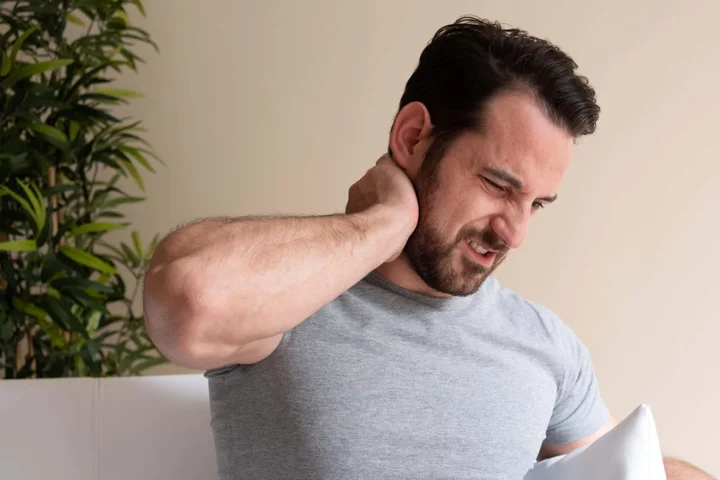
This is how stress affects different parts of the body
The increased focus on mental health in the last few years has seen more and more people turning to things like mindfulness, meditation and talking therapies to cope with stress. While these techniques can be very effective, it’s important to remember that stress isn’t ‘all in your head’ – it can have a serious physical impact as well. “Stress is how you feel and respond when life puts you under a lot of pressure,” says Dr Luke Powles, associate clinical director at Bupa Health Clinics. “A certain amount of stress can be positive, as it can help you prepare for challenges and respond to them,” Powles adds. “But too much stress, especially over a long period of time, can cause both mental and physical problems.” That’s why it’s vital to look at the sources of stress in your life and be aware of both the short and long-term symptoms. Here’s how stress can affect different parts of the body… Heart and lungs A sudden surge of stress can make you feel like you’ve just run up several flights of stairs. “Immediately, you’re going to get an increase in your heart rate, with that almost panic attack or anxiety-like feeling,” says Dr Alka Patel, aka the Health Hacktivation Doctor. “Your breathing rate is going to speed up as well, because you’re trying to oxygenate your blood.” That’s also why you might get sweaty palms or pits: “You get vasodilatation of your blood vessels – you’re basically trying to increase blood flow to your body, so sweating is a very immediate phenomenon for most people.” Stressful situations can raise your blood pressure temporarily too, Powell says: “If you’re stressed over a long time, you could possibly develop long-term high blood pressure.” The link between stress and heart disease is mitigated by other factors. “Stress may not directly cause coronary heart disease, such as a heart attack or stroke and cholesterol,” says Powell. “But if you smoke, drink, or eat more to cope with stress, you increase your risk of these. Stress may also increase the risk of type 2 diabetes.” Doctors also warn about heart rate variability (HRV), meaning the variation in the pauses between heartbeats. “You want a high HRV because you want to be adaptable,” Patel explains. “When you’re under chronic stress your HRV starts to drop, and that tells you that you’re not resilient in the face of stress.” Stomach and gut Feeling too anxious to eat? Or craving carbs when you’re under pressure? “You’re releasing this surge of cortisol, the stress hormone, very quickly, which is then trying to get as much sugar and fuel on board,” Patel explains. “A lot of people will then either notice the hunger response: ‘I’ve got to eat lunch to manage my stress’. Or you notice the dip, which is: ‘I don’t want to eat, I can’t eat anything else’.” You might experience digestive issues as well, she continues: “With an immediate stress reaction, everything else in your body has to stop. This means you can start to get those symptoms of diarrhoea, upset stomach, that kind of thing, because all of those digestive processes have to have to halt in order to manage your stress.” There are also some links between chronic stress and certain illnesses, including digestive complaints. “If you have a pre-existing health condition, stress could make it worse, or flare up,” says Powell. “Examples of conditions that can be aggravated by stress include irritable bowel syndrome, eczema, asthma and psoriasis.” Muscles A surge of stress can cause muscle spasms called fasciculation and tension in the cervical muscles of the neck, which might lead to a headache. “People don’t necessarily associate headaches with muscles, but you can get spasms in your upper neck muscles and shoulders,” Patel says. “You feel the tension in the muscles going over your scalp – and that’s why we call these tension headaches.” Teeth and mouth Stress can also harm your oral health, which should be dealt with by a dentist. “Teeth grinding (bruxism) is often linked to stress, but lots of people aren’t aware they have the condition because it happens in their sleep,” says Powell. “Symptoms include headaches, earache, stiffness and pain in the jaw or mouth; teeth which are breaking or look worn down; and facial swelling.” Inflammageing A hot topic among longevity specialists in recent years, ‘inflammageing’ means chronic inflammation that has a damaging effect and is caused by a variety of diet and lifestyle factors. “Stress accelerates ageing, and then there’s a whole cascade of stuff that goes on as a result of that,” says Patel. “[It affects] your immune response, the communication between your cells, muscle function and your bones.”
1970-01-01 08:00
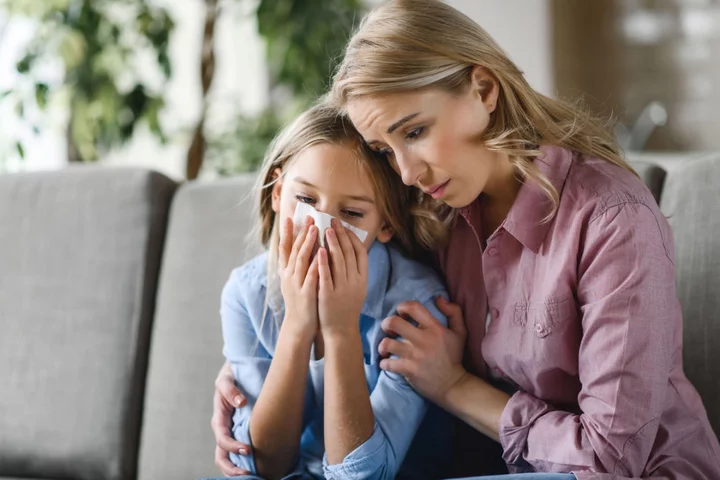
How to protect your kids and yourself from back-to-school colds
While your child may be excited about returning to school this September, there’s also a little anxiety about the one thing that can put a spanner in the works: a cold. As Dr Dave Nichols, of MyHealthChecked, an at-home wellness testing company, puts it: “The return to school following the summer holidays often coincides with a rise in a number of respiratory illnesses, including the common cold.” Common symptoms include a cough, sore throat, nasal irritation, nasal discharge (rhinorrhoea), a fever or generalised malaise, explains Nichols. “While the common cold can affect all population groups, the National Institute for Health and Care Excellence report this to be far higher amongst children, who experience an average of five to eight colds per year.” Nichols continues: “Adults who have regular contact with children are also seen to have colds more frequently.” He says children are especially important in the transmission, acting as reservoirs for the infection as they have fewer antibodies and a more immature immune system, making them more susceptible to the common cold. “Direct contact with the skin or hand contact with an infected object are key ways the virus is transmitted,” notes Nichols. “Which explains why numbers seen amongst children are higher, as they are more likely to have close contact with each other in nursery and school.” While there is no cure for the common cold, he says prevention remains crucial in order to protect ourselves from illness. Here are some top tips to reduce the chances of catching a cold… Adopt good hygiene measures Basic good hygiene measures are an important way of reducing the transmission of viruses, says Nichols. Wash hands frequently with warm soap and water if you (or the kids) have symptoms, or have come into close contact with someone who has symptoms. He says to avoid sharing items within households, such as towels, can also help. Get into a physical exercise routine Ensuring regular physical exercise is important because it has been shown to reduce the chances of people developing viral illnesses such as the common cold, advises Nichols. “Exercise plays an important role in boosting immunity by increasing the circulation of some important immune cells, which fight against infection,” says Nichols. “It also plays a key role in helping to reduce stress and the release of stress-related hormones within the body, which has an important impact.” Eat healthy foods to maximise your wellbeing “Eating well will help support a good functioning immune system,” says Dr Emeka Okorocha, medical doctor and TV personality. “The body needs a range of nutrients and vitamins to stay strong and healthy, and prevent the development of disease.” He highlights the following vitamins… “Vitamin A, which is converted from beta carotene found in vegetables such as sweet potatoes and beetroots, is very good for helping support the mucosal lining in your nose and lungs – and helps defend against infection. “Vitamin C has always been considered a good preventative vitamin from catching colds, this can be found naturally in fruits like strawberries, blueberries, blackberries and raspberries – and in leafy vegetables like spinach as well as broccoli, peppers and peas. “Vitamin D that many of us get from natural sunlight is also ideal for overall health – and studies have shown that people lacking in vitamin D are more likely to succumb to infection.” In winter months, when there are lower levels of natural sunlight, he says you can obtain vitamin D from foods such as salmon, mackerel, eggs, and mushrooms. Berries are very beneficial Okorocha continues: “I love fresh berries – strawberries, raspberries and blueberries, for example, are high in antioxidants and contain lots of vitamin C, which helps our bodies to produce antibodies that keep us from getting sick. “Berries are also high in flavonoids which help protect cells in our immune system by promoting activation and secretory processes within cells.” He says studies have indicated that regularly eating fruits such as blueberries may decrease your likelihood of catching a cold. Get adequate rest and sleep Ensuring you’re getting adequate amounts of rest and sleep is crucial in helping to reduce your risk of becoming unwell, urges Nichols. “A healthy adult needs between seven to nine hours of sleep per night, with children requiring longer,” says Nichols. “Sleep quality has been shown to be an important predictor of immunity, with those regularly sleeping under the recommended amounts more likely to develop a cold. “Improving your sleeping pattern is therefore an important way to reduce the chances of becoming unwell.” Read More Former royal chef explains why Prince William and Kate’s children don’t eat with them ‘You think it’s going to be a money making machine’: How modern life killed the hobby People defend bride after father-in-law explains why he left wedding early 4 hacks to get teens off the sofa and get active – as study warns of heart damage Elle King opens up about her ‘deep depression’ amid two-year postpartum journey BBC Radio 2’s Tony Blackburn reveals he had sepsis and pneumonia in health update
1970-01-01 08:00

Elle King opens up about her ‘deep depression’ during pregnancy and two-year postpartum journey
Elle King has spoken out about suffering with a “deep depression” during and after her pregnancy. The singer, 34, took to Instagram on Wednesday (23 August) to speak candidly about her mental health, two years after welcoming her son, Lucky, who she shares with tattoo artist Daniel Tooker. Her post included different videos of herself, in which she was working out, cleaning her skin, or singing on a stage. In the caption, she went on to reflect on her weight loss journey throughout the last two years, and acknowledged that she still plans to continue her workout routine. “I am making this post to share my journey from 284 lbs at 5‘3 from pregnancy 2021 - now 2023,” she wrote. “It doesn’t happen overnight. It didn’t even happen in a year for me. In fact, it’s an ongoing still working towards ever changing goals kinda thing.” King continued her post by opening up about her mental health struggles - both during and after her pregnancy - which included postpartum depression. “I fell into a very deep depression during my pregnancy. I also didn’t even realise how intense postpartum depression is and was until I very slowly began to crawl out,” she wrote. “I felt trapped in my body.” While symptoms of postpartum depression can vary, some of them can include difficulty bonding with your baby, withdrawing from loved ones, and a loss of appetite, according to the Mayo Clinic. In her Instagram caption, King went on to explain that amid her symptoms of postpartum depression, she started working out more. She then acknowledged that she’s now seen her body get “stronger” over time. “Metabolic workouts. Light cardio to warm up my body, my lungs, my voice, and my spirit. I am a creature of habit, so I changed my f***ing habits,” she wrote. “Every few weeks I feel my body getting stronger. I add more workouts.” The “Ex’s & Oh’s” singer expressed that while she wanted to lose weight after welcoming her baby, there was “so much more” insentive since her brain “functions better on the days” that she moves her body. She also described how she’s now embraced the way that her body looks. “Some days I count stretch marks. Some days I hug myself and say thank you to my body. Today is a kind day. I’ve been tiny, I’ve been huge, BUT RIGHT NOW I’M HEALTHY,” she continued. “I can’t believe that I even have to say this, but no, I am not on any weight loss medication.” She added that she’s had a few health conditions over the years, including being pre-diabetic and suffering with Polycystic ovary syndrome (PCOS). PCOS is a condition that consists of “problems with hormones that happens during the reproductive years,” as noted by the Mayo Clinic. Symptoms can range from irregular periods to polycystic ovaries, which are “follicles containing immature eggs may develop around the edge of the ovary”. King continued her message by sharing that her “diabetic grandfather died” when she was 10-years-old, after she “watched him prick his finger and give himself shots”. She concluded by showing her support for her followers, and by sharing the goal of her workout routine, writing: “I do not judge anyone who is trying to live a healthier life. I can only share MY OWN JOURNEY! I just hope to live a long, wonderful, healthy life where I can drink a lot, eat fish, laugh as much as I can, and die happy.” This isn’t the first time that King has been open about some of the health challenges she has faced. When announcing her pregnancy in 2021, during an interview with People, she revealed that she’s had struggles with infertility, explaining that she previously suffered two pregnancy losses due to her PCOS. “It’s such a major thing that so many people go through, but it’s so secretive - like you have to go through it alone,” she said about the pregnancy loss. “Nobody talks about it. It’s like you’re supposed to feel shame; like you’re not supposed to tell people before 12 weeks, because if you lose it, it’s going to be embarrassing for you and you don’t want other people to get their hopes up. Like, holy s***.” Read More New mother filmed doing laundry seven days after giving birth sparks debate ‘It can hit everyone’: Postnatal depression is surging, and it’s still misunderstood Olivia Munn opens up about her postpartum body 20 months after giving birth Sienna Miller pregnant with her second child Serena Williams celebrates second pregnancy with ‘pre-push party’ Lisa Snowdon opens up about ‘tortured thoughts’ after abortion: ‘Was that my chance?’
1970-01-01 08:00
